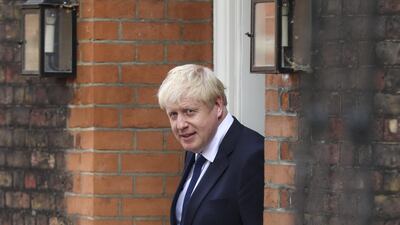Boris Johnson was warned on Monday by the City of London, which represents the interests of Britain's powerful financial services industry, that there will be "no winners" from Brexit, as he looks set to embark on a premiership that removes Britain from the European Union with or without a withdrawal agreement by October's end.
The former mayor of London and British foreign minister is expected to take the keys to 10 Downing St as the next Conservative prime minister on Wednesday amid a cavalcade of warnings about the imminent dangers posed by his policy platform.
Catherine McGuinness, the corporation's policy director, told The National that the uncertainty sapping the economy over the three years since the referendum to leave the EU had already been damaging. "There are no winners from Brexit," she said speaking at the Guildhall headquarters of the City's council.
A rancorous collapse of the withdrawal negotiations and sudden upheaval on October 31 would sour relationships needed to repair the immediate shock. “Brexit has got to the point it is seriously damaging and a no-deal will be particularly damaging,” she said. “We are already seeing increasing paralysis after three years in some sort of limbo.”
When the winner of the Conservative Party race is announced on Tuesday, pundits expect Mr Johnson to cruise to an easy victory. In the leadership race, he has drawn support from rival Jeremy Hunt by vowing to leave “come what may” on October 31.
However from the professionals' perspective, the impact on business would be immediate. “No-deal Brexit would have really negative consequences,” she said. “Big banks would be able to cope, but we worry about the state of readiness of SMEs. Fragmenting markets increases costs for institutions and reduces liquidity and makes lines of business unprofitable. Putting up barriers makes businesses become unprofitable.”
With 80 percent of the British economy made up of services, even the free trade agreement on offer with Brussels already has serious limitations for City financiers. In a sign of how the EU can cut off access to non-members, Brussels froze out Swiss stock market trading in June. “We have watched with interest and concern,” she said.
European sources tell Ms McGuinness that a settlement with the EU would be impacted by circumstances when the country leaves. Bad feeling would mean a deal would only come in the long-term with harmful consequences beforehand.
“We don’t have a choice, we will have to trade with this part of the world,” she said.
The fundamental global appeal of the British capital as a financial centre stood practically unrivalled since the Big Bang reforms in the mid-1980s. Acknowledging some of these qualities have “diminished”, Ms McGuinness said the City was having to sell its strengths to the world in new ways.
“London remains an international financial centre. For the last couple of decades, it has been self-evident that people need to use London,” she said. “We now need to prove our case a bit better.”
So far, European rivals have taken bits of City business but Frankfurt, Luxembourg, Dublin and Paris have not seized whole chunks.
The independent migration policy that has been promised after Brexit has put other clouds on the horizon, particularly over the bright spots of business, rapidly growing technology, green and crypto-currencies. “Brexit threatens it if it reduces access to people,” she said.
Sterling compounded its recent losses on Monday – the pound has fallen more than five per cent in recent weeks – after the country’s main economics think tank, the National Institute Of Economic and Social Research, said a recession may have already started, even before the October deadline.
“The outlook beyond October, when the United Kingdom is due to leave the European Union, is very murky indeed with the possibility of a severe downturn in the event of a disorderly no-deal Brexit,” a report said.
Industry added its voice to the expressions of concern as the director-general of the CBI, Carolyn Fairbairn, said
She urged Britain’s next leader to “get the economy back on track” as she said business leaders feared the impact of a no-deal Brexit.
Ms Fairbairn added the third British leader in three years, should be “indisputably pro-business” and deliver a “long-term, compelling vision for our future”.
Political instability is certain to continue even after Mr Johnson takes over. Alan Duncan, a foreign office minister, resigned in anticipation that Mr Johnson would triumph. He unsuccessfully pushed for a House of Commons vote on his party colleague before the former London mayor is installed in Downing St.



